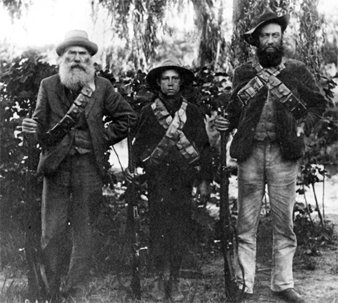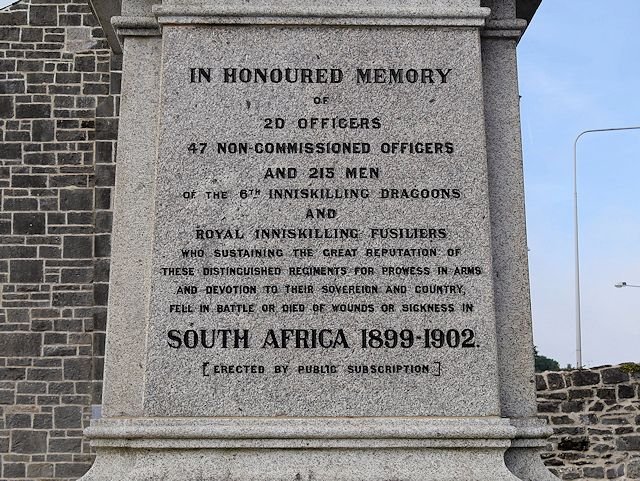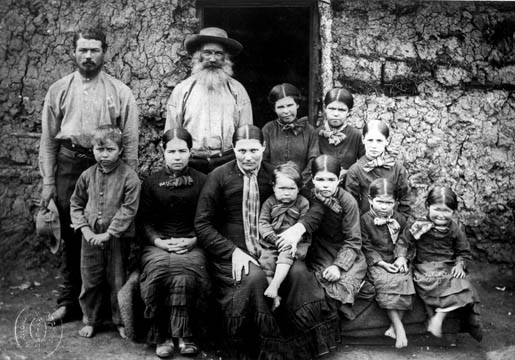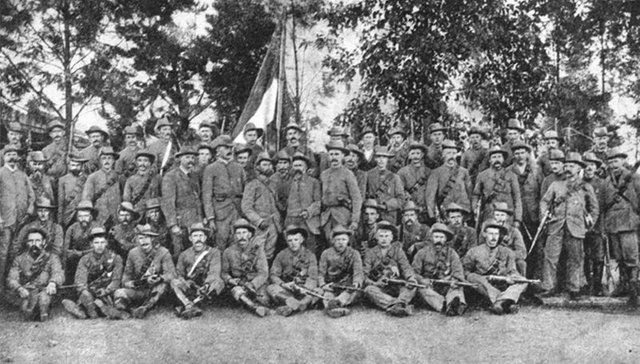Hatred, chains of Iron – part 2 – resentment turns to hatred

(three generations of Boer soldiers)
Britain was the dominant global player at the turn of the twentieth century. Their colonies spanned the globe. They boasted that the sun never set on the Union Jack. Their military strength was great; a mighty navy and many professional soldiers. The supremacy of their race was reinforced by the ideas of Charles Darwin. Their mission was to civilise the world and give them Christianity and make all the lesser races a part of the British empire. Of course if their vision was not appreciated and resisted by various tribes and peoples, well, the power of the British Empire’s armies and navy would soon sort them out!
This was the case in South Africa, the surly uneducated farmers were sitting on the greatest gold resources of the world and they just wanted to farm and be left alone?! A most unsatisfactory situation.

(the great dream of Rhodes)
Cecil John Rhodes had a great dream, that the British flag would rule from Cape Town to Cairo. Rhodes had acquired a great deal of wealth from the Kimberley diamond fields. Whereas you and I would just sit back and enjoy our fortunes, it was never enough for Rhodes. The British Imperial motive was too great to be set aside. The lust for more money and dreams of greater fame and recognition could be his. He had the means and others who believed as he did. There were over 50 thousand “Uitlanders” or foreigners, mostly from England in the Witwatersrand. There were only about 30 thousand white male Boers. Paul Kruger, the president of the Transvaal, knew to give the vote to the “Uitlanders”, would spell the end of the independent Transvaal Republic. Thus they remained foreigners and were not allowed to vote. Much was made of this in British Media. Real problems arose from the high tax rates that the miners had to pay to the Afrikaner government. This created a great deal of unhappiness at their unfair treatment by the government in which they, the foreigners, had no say.
The atmosphere seemed ripe for revolt, so in 1894/5 Rhodes (who was the prime minister of the Cape Colony at the time), got Leander Jameson to lead a group of just over 600 men into the Transvaal. The intention was when the revolt broke out in Johannesburg, they would arrive to bring “peace and order” to the Transvaal. One of their key objectives was to capture the armoury in Pretoria.
The Jameson raiders were too anxious to start and the “Reformers” in Johannesburg were too reluctant to revolt. The end result was a disaster for Rhodes and Britain. The surviving raiders were sent back to Britain to be punished and a million pound fine was paid to the Transvaal by the British South Africa Company. But Jan Smuts knew it was only a matter of time before war would be started in earnest. The next four years would be spent in building up their military strength.
When the second Boer War started England was overconfident as usual and suffered several major defeats. Huge reinforcements of artillery and men were rushed in. The lightly armed Boer armies retreated without too much resistance (not too much point when you only have a rifle and your opponent has a cannon). The formal war was over in late 1900. Britain celebrated but too soon.

Even though about 40 thousand Boer soldiers surrendered, there were about 20 thousand that refused to surrender. They formed into commandos and attacked various British supply convoys with devastating effect. They were hard to pin down and lived off the veld and sympathetic farms provided fresh horses and food. The war would drag on for another two years.

British Military Leadership were in a quandary because public sentiment was turning as the war was taking far longer than envisaged. Also the losses of life being suffered by British forces was demoralising the public. Anti-British media gleefully reported the problems the arrogant British military were suffering under the hands of a few Boer farmers.

(Boer war volunteers from Finland and Scandinavia)
The Boer armies were counting on this to force peace with Britain but their hopes were in vain, this time there would be no peace offers.
General Roberts instituted an infamous policy of scorched earth. Farms were destroyed, crops burned and all livestock slaughtered. Even the farmlands were salted to destroy any hopes of growing crops. All the women and children (white Boers) were herded into concentration camps where many thousands died. Black farmers and labourers were also herded into camps for black people where almost as many died but their tale of suffering was only a mere post note in the history where the white races clashed. There were also block houses, strongpoints and barbed wire fencing off huge areas to restrict the movement of Boer guerrillas and starve them into submission. This hardened and embittered feelings in the Boer resistance. Resentment became hatred.
Sentiment in Britain and amongst politicians wanted the war to end because German ambitions to expand their empire in Europe was becoming clear. Devastation to farmlands in the Transvaal and Orange Free State was taking a terrible toll on both fighter and family in concentration camp. As a famous young South African author, Herman Charles Bosman pointed out, the real Boer war was suffered for in the concentration camps by the women and children.
The British however, had to win in the end due to superiority in numbers and weaponry, and the Boer Generals were forced to sign the Vereeniging Treaty in May 1902. To the amazement of the humiliated Boer Generals, Botha and Smuts, in particular. Lord Kitchener (successor to Lord Roberts) spoke behind the scenes to Jan Smuts and told him that in the next elections in England, a new government would take power and the new leaders of Britain would be very sympathetic to the Boer nations, and probably even allow them self-rule. Smuts grasped at this ideal and won a majority of the leaders into signing their surrender.

Terrible divisions grew between those who would work for the growth of a new South Africa under British Colonialism and the Nationalists who clung to their hatred of all things British.
When all the surviving Boer farmers returned to their lands, many were unable to resume farming as their lands were destroyed and their homes were burned shells. Nearly all families had suffered personal losses of wives or husbands or children. Many of these people were forced to migrate to the Witwatersrand to become miners. To work for the very people who had destroyed their lands and their governments.
Former heroes of the Boer War, Louis Botha and Jan Smuts, were vilified by the Boer farming communities whereas in urban areas, they were regarded as heroes. Botha’s heart was broken and he died an early death. Smuts was a man of vast intellect and poor communication skills relating to areas such as patience and cooperation. His vision to unite the white races was driven at all costs. Smuts and many of his followers could move on and embrace the unpalatable idea of working within the British Empire, but aided by the Nationalist Party, the majority of Afrikaners remained trapped in their painful past where so many suffered and died.
It is quite curious isn’t it? On the one hand a strong sense of unity is fostered as the past is remembered. Yet on the other the hatred traps them in the past where they struggle to move forward. But without their stubborn nature, their culture and language would have been overwhelmed by the Anglicisation of the English language. The political party of Smuts (the South African Party or SAP) was over run several times by whipping up fear of the Black masses in the rural farming communities by the Nationalists.
Yet the drive of the Afrikaner for self-determination and self-rule in their own republic came at a great cost. The majority of the population of Southern Africa was non-white. Their drive for political emancipation would become the drive of the Black man in the future for his own emancipation. What Britain was guilty of, the Afrikaner Nationalist government would become guilty of too.
As a humorous side note, my Dad, was travelling down in a lift with an Afrikaans woman in 1961. While the lift was still going down, she lifted her arms in the air and exclaimed; “at last, we are freeee!” Puzzled my Dad asked her; “free from what?” Came her response: “Free from the filthy British!”
Irony in its cruellest form.
Very interesting history my dear friend.thanks for sharing with us
Here all are traditional and magnificent looking to all
Its quite interesting read. Though I'm not much interested to read history which always shake my mind badly.
Great writing about Hatred... Your article has some educative things about our life...
That comment puts an interesting slant on it
History is the most educative part of any nation as we learn a lot from history. History is the inspiration to build a nation. I'm pleased to read the history though it's war related but more important it's about freedom.
a good piece of history. Upvote
Very interesting facts of the history of the South African state and here understand the whole scale and the tragedy of this war! Thank you @fred703
Very good reading, I am always interested in reading history, let alone the history of war in defending the country,
It is very interesting to read your message. After the Anglo-Boer War, the whole of South Africa fell under British rule, and the establishment of a single dominion, the South African Union that was part of the British Empire until 1961, was formally proclaimed. And what happened then. I think you write 3 part. Thank you for sharing.
This history totally interesting for everyone, you can understand when you read all comments. its really History is the most educative part of any nation as we learn a lot from history.
yes sir i agree with you, its really interesting history.